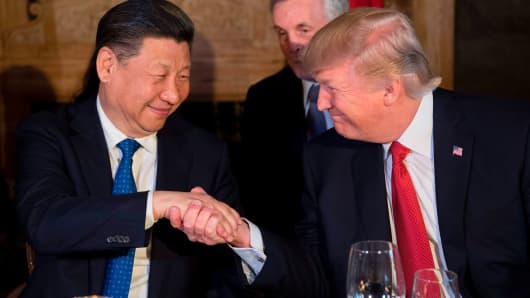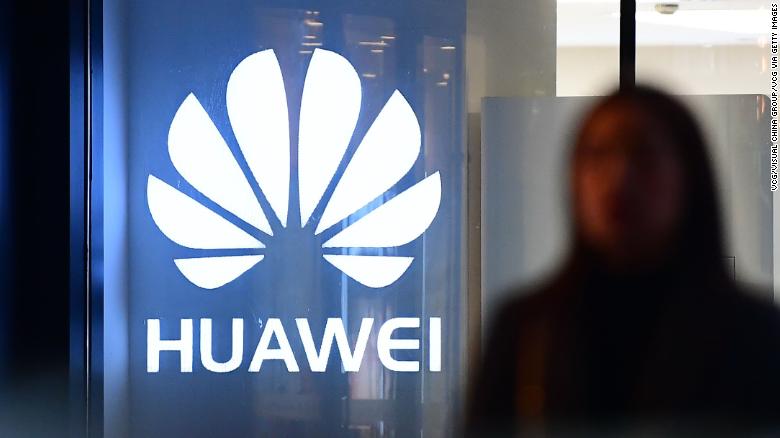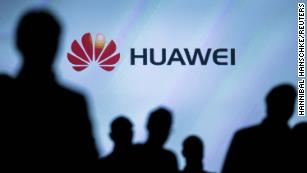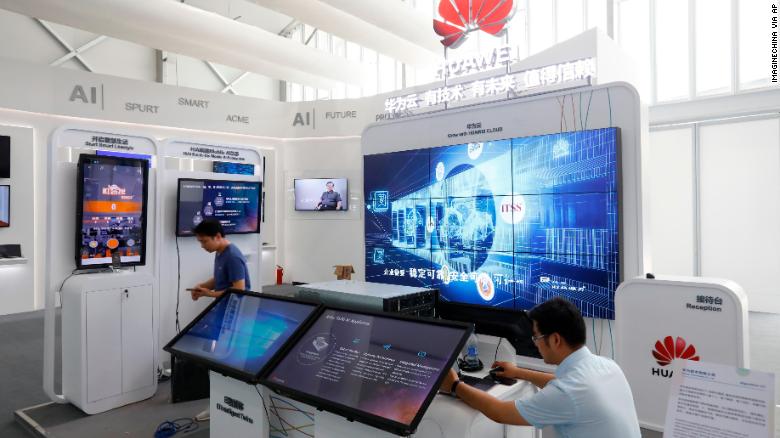- America’s flexible and growing $20.7 trillion economy would take in stride the loss of $130 billion of its goods exports to China, with supply chain disruptions filled in by substitutes.
- For China, a loss of $550 billion goods exports to the U.S. would be a big deal.

President Donald Trump and Xi Jinping during dinner at in West Palm Beach, Florida, on April 6, 2017.
America's soaring and systematic goods trade deficits with China — with 2018's estimated to reach $430 billion, for an increase of more than 20 percent from the previous year — are one of the fundamental political and security issues dividing the world's two largest economies.
No one should, therefore, be surprised by the statement made last week by the U.S. Commerce Secretary Wilbur Ross that Washington and Beijing were "miles and miles" from any trade agreement.
China, after all, is considered by the U.S. to be a strategic "competitor" (adversary) and a revisionist power, seeking to upend the American world order.
According to U.S. Bureau of Economic Analysis figures, American goods exports to China amounted to a total of $102.5 billion while China's goods exports to the U.S. came in at $447 billion in the first 10 months of last year.
That gave China a huge advantage of a $344.5 billion trade surplus, a number that accounts for nearly one-half of America's total trade gap.
Big deal?
Big deal?
Yes and no.
Such a totally and systematically unbalanced bilateral trade relationship must be corrected.
Such a totally and systematically unbalanced bilateral trade relationship must be corrected.
Both countries recognize that.
The only problem is that Washington and Beijing don't seem to agree on a mutually acceptable procedure to reach the necessary trade adjustment.
The logic and the urgency of the matter would call for an immediate, sustained and large increase of U.S. sales to China, and a similar decline of Chinese exports to America.
The logic and the urgency of the matter would call for an immediate, sustained and large increase of U.S. sales to China, and a similar decline of Chinese exports to America.
To support that process, China should broaden market access to American firms and respond to American complaints about predatory trade practices, such as export subsidies, illegal acquisitions of intellectual property, forced technology transfers and more.
Trade is part of the US core strategy
That sounds like a two-step procedure — immediate redirection of trade flows and structural trade policy changes — but it isn't: A sustained and successful trade adjustment requires synchronous moves on both policy tracks.
Simple, isn't it?
Trade is part of the US core strategy
That sounds like a two-step procedure — immediate redirection of trade flows and structural trade policy changes — but it isn't: A sustained and successful trade adjustment requires synchronous moves on both policy tracks.
Simple, isn't it?
Yes, but nothing works.
Two years into the Trump administration's term of office, China will have accumulated a $1 trillion surplus on its U.S. goods trade once all the 2018 numbers are in.
I am not privy to trade negotiations, but from media reports in the public domain it appears that China finds the American position unacceptable when U.S. officials demand Beijing stop technology thefts, trade-distorting export subsidies and suspicious exchange rate management.
Underlying all that is Washington's view that there would be no sustainable progress on reducing the U.S.-China trade imbalances without transparent and verifiable structural trade and economic reforms in China.
Hence the impasse.
I am not privy to trade negotiations, but from media reports in the public domain it appears that China finds the American position unacceptable when U.S. officials demand Beijing stop technology thefts, trade-distorting export subsidies and suspicious exchange rate management.
Underlying all that is Washington's view that there would be no sustainable progress on reducing the U.S.-China trade imbalances without transparent and verifiable structural trade and economic reforms in China.
Hence the impasse.
China cannot accept reform demands to discontinue illegal technology acquisitions and export subsidies.
And China would not even think of allowing American authorities to conduct enforcement reviews of its own trade and economic reforms.
What's the way out of that deadlock?
What's the way out of that deadlock?
It's called the World Trade Organization.
Yes, a possible solution here would be for the U.S. and China to accept the screening and arbitration procedures of the WTO.
But that is something that, most probably, Washington would just laugh out of court.
So, there it is: The U.S.-China trade talk has hit a blind alley.
So, there it is: The U.S.-China trade talk has hit a blind alley.
China suspects Washington of pursuing an hostile political and security agenda under the guise of trade talks.
U.S. "pivots to Asia" and official statements about opposing China's global expansion have convinced Beijing that Washington was out to disrupt the Chinese economy and to stop China's rapid ascent as a credible challenger to America's interests.
How on earth can you have a bona fide trade negotiation – or any negotiation at all – under those circumstances?
Take seriously the statement by Ross that the U.S. and China are "miles and miles" away from a trade agreement.
I would also add a rider: As things now stand, such an agreement is nowhere in sight.
How important is that?
How on earth can you have a bona fide trade negotiation – or any negotiation at all – under those circumstances?
Take seriously the statement by Ross that the U.S. and China are "miles and miles" away from a trade agreement.
I would also add a rider: As things now stand, such an agreement is nowhere in sight.
How important is that?
Not very much, in purely economic terms.
For America's growing $20.7 trillion economy, a potential loss of $130 billion of its exports to China is a drop in the bucket.
Assuming Washington takes a radical approach to China trade, America's flexible economy would take in stride temporary disruptions of its supply chains, and their replacement by widely available gross substitutes.
And don't worry about the "global multilateral trading system" – a fiction bandied about to discredit U.S. policies seeking to shake off its excessive trade deficits.
And don't worry about the "global multilateral trading system" – a fiction bandied about to discredit U.S. policies seeking to shake off its excessive trade deficits.
That "system" was killed the minute the trade surplus countries took it as a license for free-riding on the rest of the world.



